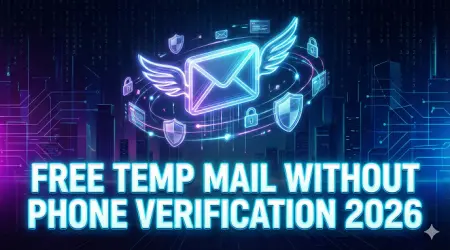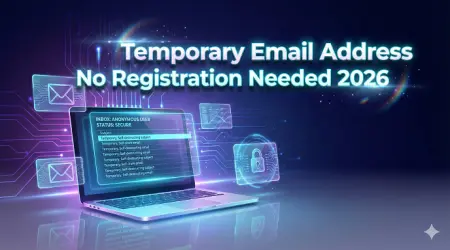

Can Temp Emails Be Tracked? The Shocking Truth Revealed
Can Temp Emails Be Tracked? The Shocking Truth Revealed
In today's digital age, privacy is a luxury. From signing up for newsletters to verifying accounts, email is often the first key to accessing online services. But what if you don't want to reveal your real email address? Enter temporary emails - quick, disposable accounts that disappear after a short period of time.
The most burning question is; Can temporary emails be traced? The simple answer is: Yes, although there are several conditions. So, now, it's time to take a deeper look at how temporary emails work, what are their dangers, and whether your activities in the cyber world are completely anonymous.
Introduction: Understanding Temporary Emails
Temporary email addresses (also known as disposable emails or throwaway emails) are increasingly being used. They are designed to provide privacy, convenience, and security in a digital world filled with spam and data hacks.
What Are Temporary Emails?
Definition of Temp Emails
A temporary email is an email address that exists on a short-term basis, usually for a few hours or minutes. Unlike regular email accounts, they do not require registration and do not require a certain amount of personal information to be provided.
How Temp Email Services Work
- The provider creates some randomised email address
- You utilise it to receive verification or one-time messages.
- The email and inbox spontaneously destroy after an allotted period of time.
Why People Use Temporary Emails
Protecting Privacy Online
Temp email helps one to use the login when registering to a service without divulging his or her official personal email address.
Avoiding Spam and Unwanted Emails
Since this email goes off, users are not spammed because this email does disappear.
Quick Registrations and Verifications
Ideal to make a temporary account in an app, forum or site you are not going to use any more.
Can Temp Emails Be Tracked?
The biggest question has to be whether temporary emails are traceable or not.
How Email Tracking Generally Works
Traditional emails can be tracked through:
- IP addresses in the mail headers.
- Meta data of the sender and the path.
- Marketer email tracking pixels
Security and Anonymity of Temporary Emails
Most temp email services:
- Do not demand individual data.
- Go fast on data
- Share same domains to thousands of users.
This makes them difficult to track—but not impossible.
Scenarios Where Tracking Might Still Be Possible
- In case one connects without VPN, his or her IP may be logged.
- The log on the server can be subpoenaed by law enforcement.
- The hackers might use the vulnerabilities to trace their users.
Technical Aspects of Tracking Temp Emails
IP Address and Metadata Tracing
Every time you go online, your device sends an IP address. When you receive an open temporary email, there's a chance that the IP is logged by the temporary email company or even by the site you're sending and receiving messages from.
Also, email metadata may frequently include time stamps, routing information, and technical identifiers that a more sophisticated user or an investigator may use to track an origin.
Email Headers and Forensic Analysis
Even temporary emails have headers, which can sometimes reveal:
- Location of the server of the provider.
- The transmit / recieve IP addresses
- Possible routing paths overall across the web
Disposable services can easily remove personal handles, but an experienced investigator is able to trace the lines.
Limits of Temp Email Providers’ Logs
Most temporary email services state that they do not keep any logs. However, this is not always the case. Some services may only keep limited activity records to prevent abuse. The possibility that law enforcement agencies can access logs with a subpoena is rare.
Who Might Try to Track Temp Emails?
Government and Law Enforcement Agencies
Temporary emails can hinder authorities' investigations into cybercrime, fraud, or illegal activity. This can be done, but only with a court order and the cooperation of providers.
Hackers and Cybercriminals
Ironically, hackers could even follow the use of temp email, particularly when users access the accounts without encryptions. Exploitation of open links may target data that identify them
Marketing Companies and Advertisers
A lot of marketers use email tracking pixels or codes. Even if temp e-mails don't offer long-term functionality marketers can still use them for short-time tracking to comprehend user behavior.
Benefits vs. Risks of Using Temporary Emails
Advantages of Temp Emails
- Anonymity -Secures the real e-mail address
- Spam free- No junk mail in an expired inbox.
- Ease of use - Fast and easy sign ups.
- Security risks -Minimizes phishing vulnerability
Risks and Drawbacks to Consider
- Not foolproof - More advanced tracking is possible
- Short lifespan- Emails can be lost, thereby creating problems when you want to refer to the email.
- Untrusted providers - Data might be spied on by an untrusted provider
- Limited functionality -Temporary mail does not provide sending only receiving.
How to Use Temporary Emails Safely
Choosing a Reliable Temp Email Provider
Use popular services such as TempMaili or Guerrilla Mail rather than some obscure services that may misuse and exploit user data.
Combining with VPNs or Proxies
It is always a good idea to use VPN which will hide your IP address and offer an extra security precaution when using temp mail services.
Best Practices for Maximum Anonymity
- When making sensitive transactions like banking, do not use temp emails.
- Clear cookies and cache when you are done with disposable accounts.
- Do not click of unsure links in temp inboxes.
Legal Implications of Temporary Emails
Are Temp Emails Illegal?
Temp-mailing is legal in general. And they are merely aids to privacy and convenience.
Situations Where Using Temp Emails Could Be Risky
- Listing criminal offences.
- Ducking the police
- Breach of the terms of service of a web site.
In such cases, temp email use could lead to legal consequences.
Alternatives to Temporary Emails
Disposable Email Domains
With other services it is possible to create whole domains that can be disposable so as to have greater flexibility than using single sign-up inboxes.
Anonymous Email Providers
ProtonMail or Tutanota are services with anonymous, and ever-lasting encrypted accounts.
Secure Encrypted Email Services
Compared to temporary ones, their principal focus is on long-term privacy, but they offer complete functionality, including receiving and sending.
Frequently Asked Questions (FAQs)
1. Is a temporary email trackable?
Not easily. Personal information is not gathered by most of the providers. When your use them without VPN, however, they may record your IP, which can be traced.
2. Do temp email hosts keep data of users?
Popular ones assert that no permanent logs are retained, though it may happen temporarily to prevent abuse.
3. Can temp email be traced by law enforcement?
Not always but in some. Authorities can track the use of temp email provided they have sufficient legal backing and willing by the providers.
4. Are disposable disposable email addresses safe in online banking?
No. Temporal emails are not to be used with financial services. They do not have the backup of permanent accounts.
5. Is there a difference between disposable and anonymous email?
Disposable: short-lived, used as a sign-up email address.
Long-term, privacy-focused, encrypted email.
6. How are temporary emails and skypit? outcomes?
It varies. Others may last a matter of minutes, and others can run up to 24 hours and more.
Conclusion: The Reality of Tracking Temporary Emails
So, can temp emails be tracked?
- However, that is only possible in special circumstances (leakage of the IP or legal searches).
- They are reasonable in terms of privacy and protection against spam in daily affairs such as subscribing to a newsletter.
- The former, however, are not panacea of anonymity on the Internet. It is best to combine them with VPNs, encrypted services, and safe browsing-related behaviors.




